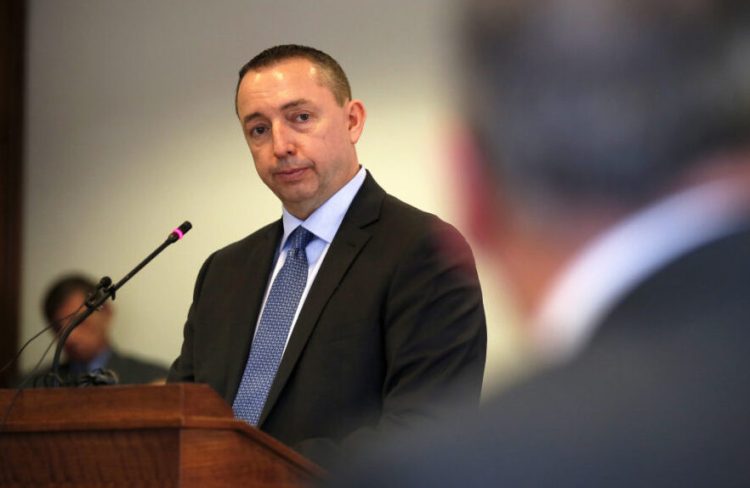Marijuana advocates are fuming over a state plan to create a new division of the Maine Drug Enforcement Agency devoted to cannabis crimes, seeing it as an effort to re-criminalize the drug three years after it was legalized.
Funded annually by $649,000 in marijuana tax and licensing revenue, the four-person unit would be tasked with curbing illegal activities that compete against state-licensed marijuana growers, processors and retailers, said Michael Sauschuck, commissioner of the Maine Department of Public Safety.
“We legalized a whole bracket of drugs and the vast majority of people are going to absolutely comply with that, but there will be those that push that limit,” Sauschuck told lawmakers Monday. “As other states have seen, there is absolutely a time and place for enforcement.”
The criminal enforcement unit would focus on marijuana crimes, like black-market sales to children, while a civil compliance unit would use regulatory tools, like license suspension or fines, to encourage licensed marijuana businesses to comply with state marijuana rules, like testing all products.
The state’s marijuana compliance unit is headed by Vern Malloch, who was Sauschuck’s deputy when Sauschuck was Portland’s police chief. As part of preparing for legal sales in Maine, Malloch was part of a group of city officials to visit Colorado, which in 2012 became the first state to legalize marijuana.
The number of illegal plants seized in Colorado – grown in sprawling networks of suburban homes to be sold at above-market prices in states where marijuana is illegal – has only grown since legalization, from 5,000 in 2014 to almost 60,000 in 2019, according to the U.S. Drug Enforcement Administration.
“The black market doesn’t just go away overnight,” Sauschuck said. “All these legal people are doing everything exactly how they should. … Out of 100, 99 are doing things the right way. One is not. If they’re not, there would be criminal statutes that are appropriate.”
But the proposal to create a new marijuana enforcement unit sparked outrage among marijuana advocates who believe Maine should help new companies that are trying to comply with the regulations of a brand new industry rather than seek to prosecute them.
Mark Barnett, a Portland coffee shop owner who is applying for a recreational marijuana license, called the proposal an effort to re-criminalize marijuana. Barnett, a medical marijuana caregiver, urged Maine to treat the marijuana marketplace like any other legal industry.
“We do not want to see one additional person incarcerated for marijuana,” Barnett said. “It’s a move in the wrong direction and counter to the very idea of legalization.”
They especially don’t like the idea of using the Maine DEA, an agency created to prevent and punish illegal drug crimes, to handle criminal prosecutions related to a drug that has been legal to use in Maine for medical reasons since 1999. Recreational use has been legal since Jan. 1, 2017.
Advocates told lawmakers stories about DEA agents kicking down doors and putting guns to their heads for failure to fill out the proper paperwork, or about being forced to march 2 miles uphill to their grow for a surprise inspection by DEA agents who knew they were disabled.
Sauschuck told lawmakers that the Office of Marijuana Policy, which oversees Maine’s cannabis program and would fund the marijuana enforcement unit, had initially asked the state for troopers to work out of the office, but that wouldn’t work for the Department of Public Safety.
Supportive lawmakers like Rep. Kent Ackley, a Monmouth independent, believe such a specialized unit will help shut down the black market by creating what he called a “risk premium,” or the risk that operating outside of the regulated system could lead to a criminal record, huge fines or even incarceration.
It will be the black market that continues to sell marijuana to underage Mainers, he said. That cannabis will not be tested for contaminants, it will not be taxed and it will take sales away from the state-licensed medical and adult-use marijuana businesses, he said.
“My hope would be that we don’t have to send people to jail to convince the gray market to participate in the regulated marketplace,” Ackley told lawmakers Monday. “Nonetheless, the threat of doing that is an important piece of what we’re trying to accomplish with these four agents.”
But skeptical lawmakers questioned spending so much state money going after marijuana crimes – which Sauschuck himself admitted was a “complete bottom-of-the-rung priority” for all other local or state law enforcement – when Maine is facing so many bigger problems, like the opioid epidemic.
“I thought we legalized cannabis,” said Rep. Charlotte Warren, D-Hallowell, co-chair of the Criminal Justice and Public Safety Committee. “If we have spent a total of $33.2 million over just the time I’ve been in the legislature, why are we adding more agents for something that we actually legalized?”
Others suggested Maine should wait to see if criminal problems arise from Maine’s recreational market before deciding whether to set up an MDEA unit devoted to marijuana crimes. Former state lawmaker and retired Cumberland County Sheriff Mark Dion urged lawmakers to wait for data before acting.
Send questions/comments to the editors.


